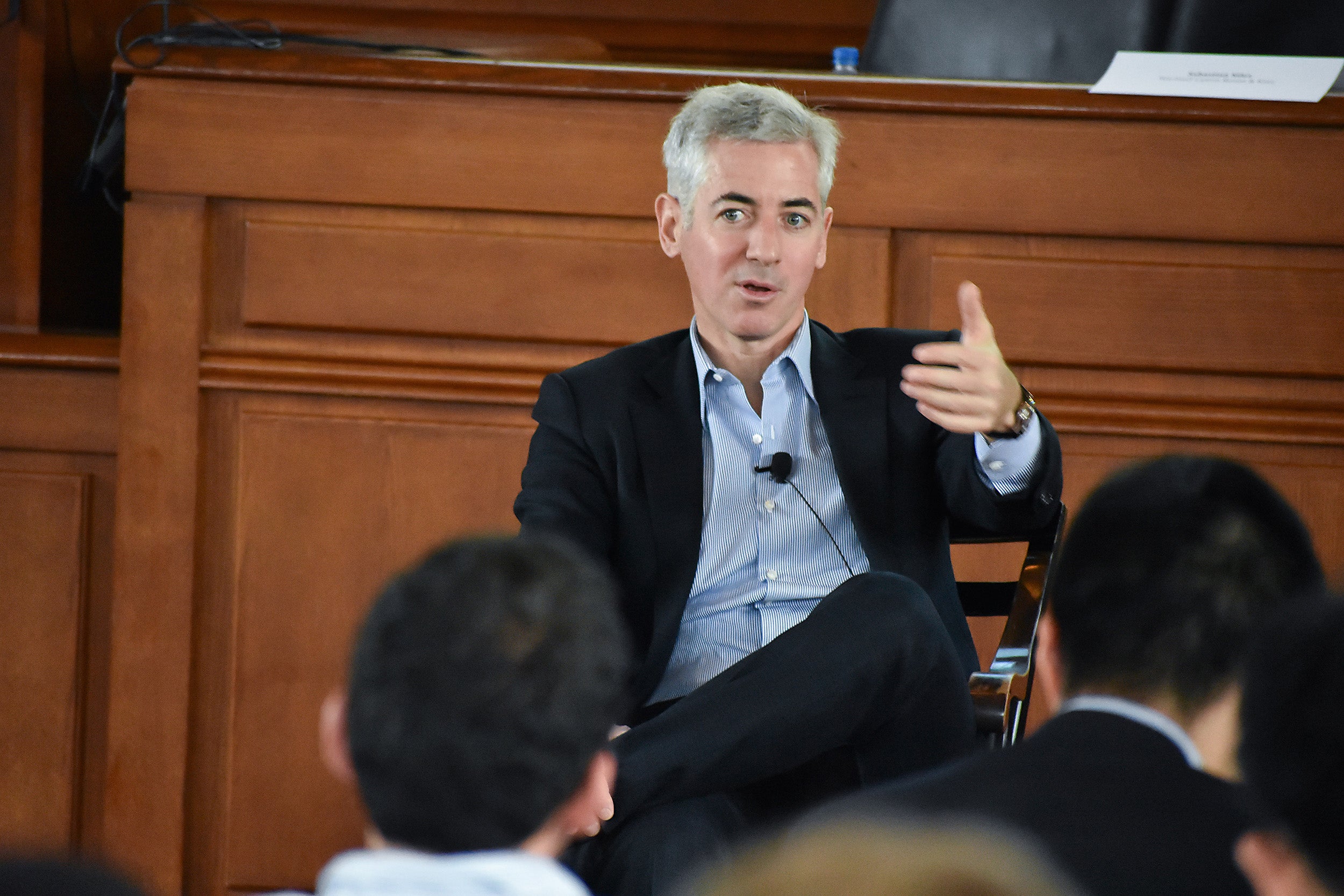The Harvard Association for Law and Business (HALB) hosted Bill Ackman, founder and chief executive officer of Pershing Square Capital Management on April 12, to discuss his views on the current state of activist investing, his experience managing a multibillion dollar fund, and the impact of shareholder activism on corporate governance. Professor Charles C. Y. Wang, Glenn and Mary Jane Creamer Associate Professor of the Harvard Business School, moderated the discussion.
The event was part of HALB’s inaugural Harvard Law School Activism Roundtable. “The core mission of HALB is to create a platform to discuss key issues at the intersection of law and business, such as shareholder activism,” said Jianjian Ye ’18, HALB co-president. “Establishing the Harvard Law School Activism Roundtable and bringing in business leaders like Bill demonstrates our commitment to this mission.”
Professor Wang opened up the discussion by situating Ackman’s position within the larger debate on shareholder activism. Quoting Martin Lipton, founding partner of Wachtell, Lipton, Rosen & Katz, which specializes in advising major corporations on mergers and acquisitions, Wang raised Lipton’s criticism that activism “has been a major driver of short-termism, reduces long-term sustainable investments . . . promotes inequality and strikes at the very heart of our society.” In response, Ackman acknowledged the existence of an entire spectrum of activism. However, he argued that activists are not buying control of a company, but only a seat at the table. Ultimately, in Ackman’s view, the board of directors makes the short-term decisions, not the activist investors.
Ackman continued by explaining why activism is good for corporations. Activism “has materially shifted the balance of power,” he noted, explaining that America’s directorship system has not been updated since the days of the Carnegies and Vanderbilts. Now, however, American corporations have diversified owners, including many index funds. Indexing particularly has democratized corporate ownership to a great degree, Ackman said, where investors big and small can participate in the financial market for a minimal fee.
Ackman argued that based on this democratized shareholder basis, the way the directors are chosen and make decisions should be more democratized as well. In this sense, Ackman said, shareholder activism means more accountability and motivation for directors “to act in the best interest of the company, shareholders, and all stakeholders.”
When asked about the rise of passive investment, Ackman sounded a word of caution against the negative effects that passive asset managers might bring to corporations. Although passive asset managers have been very vocal about the fact that they consider themselves permanent shareholders, Ackman said that he was concerned about their impacts on corporate governance. He argued that the incentive structures are built such that passive asset managers are not overly concerned about any one part of their large portfolios.
Ackman wrapped up the talk by giving his word of advice to the Harvard students in the audience: “People get themselves on a treadmill, and one of your biggest mistakes is that you have not made a mistake.” He encouraged students to focus on how to handle adversity, not how to avoid it.
After the event, Ndu Okereke ’18, the activism chair of HALB, said: “Regardless of which side of the shareholder activism debate one sits on, it is clear that activism has had a substantial impact on corporate governance and will continue to play a role. As a result, the dialogue is one that should be constructive and ongoing, whether in academic settings, corporate board rooms, shareholder investment committees or otherwise.”
This year, the Harvard Law School Activism Roundtable series has featured talks with Brad Singer, partner and COO of ValueAct Capital; Munib Islam, partner and executive team member at Third Point Management; Sabastian Niles, partner at Wachtell Lipton Rosen & Katz; Eleazer Klein, partner at Schulte Roth & Zabel; and Samuel Flax, former executive vice president and general counsel at American Capital.
The Harvard Law School Activism Roundtable was organized by the Harvard Association for Law and Business under the leadership of Co-Presidents Jianjian Ye ’18 and David Kafafian ’18, Activism Chair Ndu Okereke ’18, and Executive Vice Presidents Elizabeth Ferrie ’19 and Heather Lee ’19.
